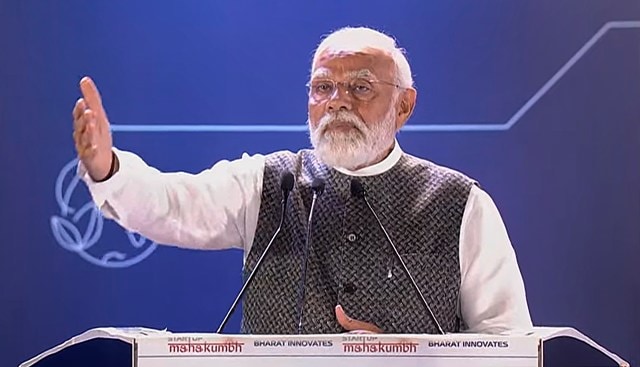Govt made ‘right moves’ for startup ecosystem to flourish: PM Modi at Startup Mahakumbh
“Today, India has emerged as a new hope and strength for the global startup space, and there has been a thought out vision behind it. At the right time we made the right decisions, and started work with startups,” PM Modi added.
 Prime Minister Narendra Modi addresses the 'Startup Mahakumbh' at the Bharat Mandapam, in New Delhi, Wednesday, March 20, 2024. (PTI Photo)
Prime Minister Narendra Modi addresses the 'Startup Mahakumbh' at the Bharat Mandapam, in New Delhi, Wednesday, March 20, 2024. (PTI Photo)Addressing the Startup Mahakumbh, Prime Minister Narendra Modi hailed India’s start-up ecosystem while also underlining the “right moves” the government made to support the sector.
There was also a political undertone to the Prime Minister’s address. Without naming Rahul Gandhi, PM Modi criticised recent remarks made by former Congress President on the term ‘shakti’. He also termed some political parties as start-ups that have to be launched again and again.
“Many people launch start-ups, more so in politics where they are launched again and again. The difference between you and them is that you are experimental,” Modi said.
“Today, India has emerged as a new hope and strength for the global startup space, and there has been a thought out vision behind it. At the right time we made the right decisions, and started work with startups,” he added.
Amid his praise for India’s start-up ecosystem, the PM also left enough room for making a political pitch with an eye on the upcoming Lok Sabha polls, confident of securing a third term in office.
Modi also outlined the importance of start-ups having granted patents for their ideas, and emphasised the opportunities that artificial intelligence (AI) can bring to the sector. “The whole world agrees that India will have an upper hand in AI,” the Prime Minister said.
While speaking about the announcement of Rs 1 lakh crore corpus for funding research and innovation in the country in the interim Budget this year, Modi said, “When I return again, there will be a full Budget”. “In my third term, I will make India the third biggest economy and start-ups will play a big role in that jump,” he added.
Thousands of start-ups and investors in areas such as artificial intelligence and software-as-a-service (SaaS), agritech, business-to-business (B2B) and manufacturing, climate tech, deep tech, direct-to-consumer, gaming and esports, fintech, and incubators and accelerators are participating in the event.
The event is being jointly organised by industry bodies Assocham, Nasscom, Bootstrap Incubation and Advisory Foundation, TiE and Indian Venture and Alternate Capital Association (IVCA). It is also supported by the commerce ministry’s Department for Promotion of Industry and Internal Trade (DPIIT), Ministry of Electronics and Information Technology (MeitY) Startup Hub (MSH), and Invest India.
At a press briefing before the event, DPIIT Secretary RK Singh had said that the government’s aim was to improve India’s global ranking in terms of innovation.
“India ranks at 40 in terms of innovation and our goal is to move up from this. Our aim is to make Startup Mahakumbh not just a big event but also an annual event, which can further propel the growth of the Indian startup ecosystem. The event aims to unite innovators nationwide and transform it into the largest global event of its kind,” Singh said at the briefing.
2023 was a challenging year for Indian start-ups. They raised a total of $8.3 billion – the lowest they have raised since 2016 when there were much fewer of these firms.
Indian start-ups also saw a decline of 72 per cent in the compound annual growth rate (CAGR) of funding in the last three years — a signal that the venture capital-fueled boom that followed the Covid-19 pandemic has ended.
In 2022, the country added 23 unicorns, which is the term used to describe private businesses with a valuation of over $1 billion. In 2023, only two firms could attain that status. More than 20,000 people working at various start-ups lost their jobs in 2023.
2024 could see founders focus more on essential metrics such as increased profitability and reduced cash burn. However, investors believe that the funding ecosystem may not get the same traction as in 2021.
Investors, though, seem bullish about the country’s start-up journey despite a blip in the last two years. Peak XV Managing Director Rajan Anandan claimed that close to $20 billion of private capital is lying uninvested and is committed to investment in Indian start-ups.
He added that the investment run rate in Indian start-ups before 2021 and 2022, was about $8-10 billion, which increased to $60 billion in 2021 and 2022 combined.



- 01
- 02
- 03
- 04
- 05




























